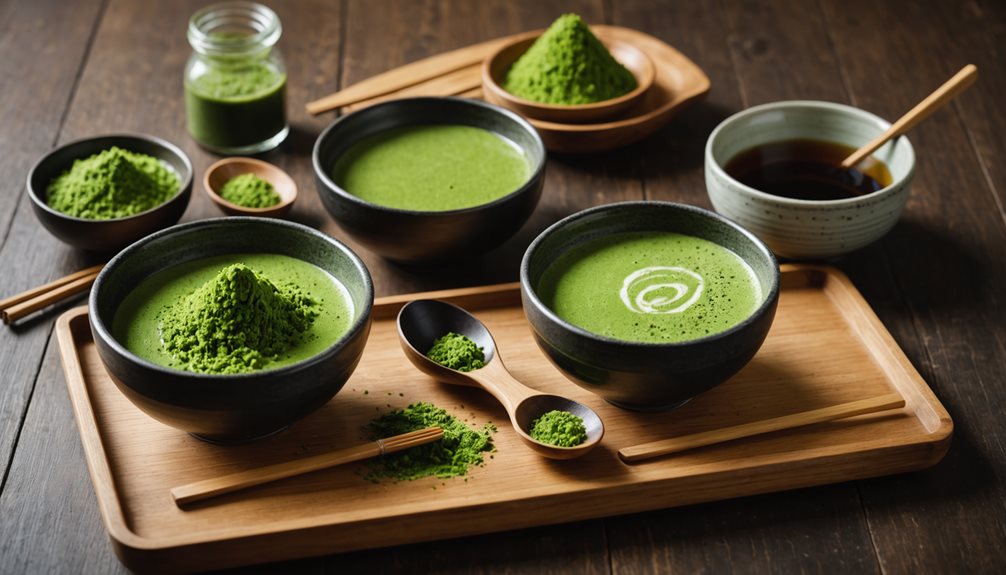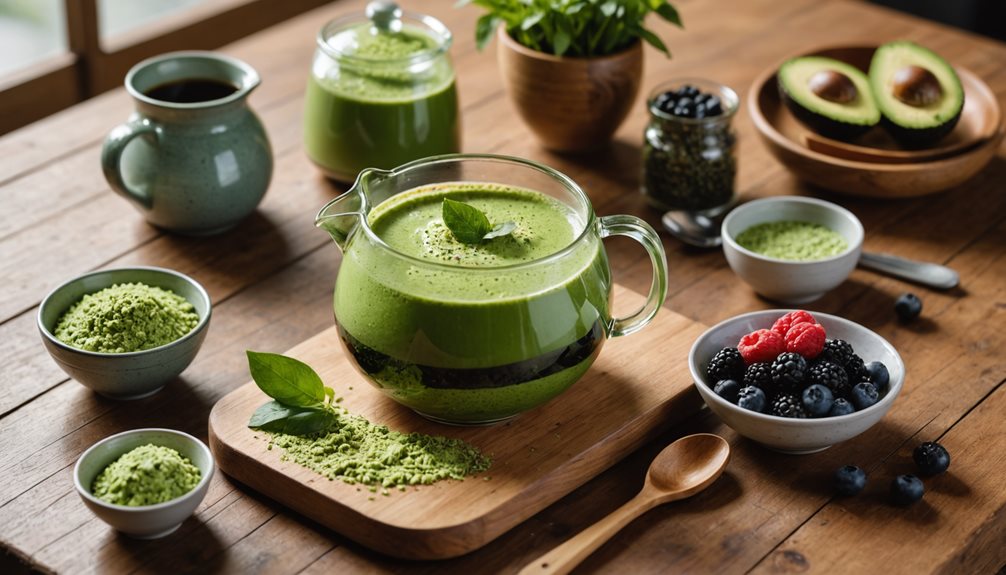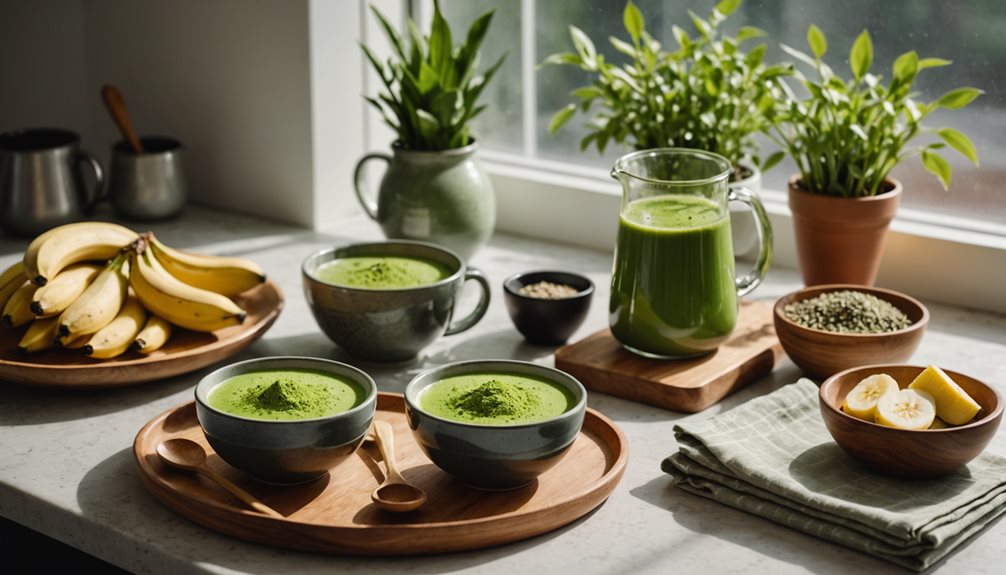If you’re looking for ways to support your gut health, you might be curious about matcha and whether it lives up to its health claims. It’s not just another trendy green drink—in fact, matcha stands out among teas because of some unique compounds. So, you may be wondering what actually happens inside your gut when you drink it, and if there’s a catch you should know about before making it part of your routine.
Key Takeaways
- Matcha is rich in polyphenols and antioxidants, which support a healthy gut microbiome and reduce inflammation.
- Consuming whole powdered tea leaves provides higher concentrations of health-promoting compounds than regular steeped green tea.
- EGCG catechins in matcha promote beneficial gut bacteria and protect the gut lining from oxidative stress.
- Regular matcha intake may improve metabolic and digestive health, lowering the risk of obesity and type 2 diabetes.
- Sensitive individuals may experience digestive discomfort or anxiety from matcha’s caffeine or high catechin content.
What Makes Matcha Unique Compared to Other Teas

Matcha differs from other teas primarily because it’s made by consuming the entire powdered tea leaf rather than an infusion of the leaves. As a result, matcha provides higher concentrations of compounds found in tea, such as antioxidants, polyphenols, and specifically epigallocatechin gallate (EGCG), compared to conventional steeped green tea.
The tea leaves used to make matcha are shade-grown before harvest, which increases their levels of chlorophyll and amino acids. Matcha also contains both caffeine and the amino acid L-theanine, which together may support alertness while reducing the likelihood of experiencing the jittery effects sometimes associated with caffeine.
Additionally, some evidence suggests that the unique combination of bioactive components in matcha may have potential benefits for gut health, although more research is needed in this area.
How Matcha Supports a Healthy Gut Microbiome
Matcha contains polyphenols, particularly EGCG catechins, which have been shown to promote beneficial shifts in gut microbiota composition.
These changes may support improved metabolic functions and are associated with a reduced risk of certain metabolic conditions, such as obesity and type 2 diabetes.
In addition, the antioxidant properties in matcha help protect the gut lining from oxidative stress, potentially contributing to the maintenance of gut health at the cellular level.
Consistent consumption of matcha has also been linked to favorable changes in gut metabolites, which play a role in regulating various aspects of health and metabolism.
The Role of Polyphenols and Antioxidants in Digestive Health
Polyphenols and antioxidants found in matcha may contribute to digestive health by supporting the gut microbiome and reducing inflammation.
The EGCG catechins present in matcha have been shown to promote microbial balance and help mitigate inflammatory processes that may affect the digestive system.
Matcha contains higher concentrations of antioxidants compared to regular green tea, which can provide additional protection to gut cells against oxidative stress.
Together, these compounds help maintain a balanced gut environment, which is associated with a lower risk of gastrointestinal disorders and may have positive effects on metabolic health.
However, further research is needed to better understand the extent of these effects and the mechanisms involved.
Matcha and Its Impact on Obesity and Metabolic Wellness

As research into functional foods progresses, matcha has been identified for its potential role in metabolic wellness and weight management.
Matcha contains polyphenols, notably EGCG catechins, which have been shown to influence gut microbiota composition. Studies indicate that these compounds can promote the production of metabolites involved in the regulation of energy and fat metabolism.
In individuals consuming high-fat diets, regular matcha intake may result in measurable changes to gut microbiota within several weeks, potentially contributing to reductions in body weight and cholesterol levels as well as a decreased risk of obesity.
Potential Downsides of Matcha for Sensitive Individuals
While matcha contains several compounds associated with potential health benefits, it may also cause adverse effects in certain individuals, particularly those who are sensitive to its active components.
The caffeine content in matcha is relatively high compared to other teas, and for individuals sensitive to caffeine, this may result in symptoms such as increased anxiety, restlessness, or digestive discomfort.
Additionally, the high concentration of catechins in matcha, although considered beneficial for some, can lead to gastrointestinal upset in those with sensitive digestive systems.
Consuming large amounts of matcha may also contribute to dental issues, as it can be a source of fluoride. Excessive fluoride intake over time may negatively impact dental health.
Furthermore, lower-quality matcha products may contain contaminants—including pesticides or heavy metals—which could pose health risks.
For individuals who are sensitive to these factors, it’s advisable to select matcha from reputable sources, moderate consumption, and monitor for any adverse reactions.
Recommendations for Choosing and Preparing Matcha
Selecting high-quality matcha is important for both flavor and nutritional benefits. Ceremonial-grade matcha, produced from the youngest tea leaves, generally contains higher concentrations of beneficial compounds compared to culinary-grade varieties.
It’s advisable to purchase matcha from reputable brands that test for contaminants, such as pesticides and heavy metals, in order to reduce potential health risks.
When preparing matcha, whisking the powder thoroughly with hot water helps to fully dissolve the powder, which may improve the release of nutrients.
Including matcha as part of a balanced diet can contribute beneficial antioxidants, but it’s best to minimize the addition of sweeteners to prevent unnecessary caloric intake.
Consuming one to two servings per day is typically sufficient to obtain benefits while minimizing the potential for caffeine-related side effects.
Daily Consumption Tips for Maximizing Gut Benefits

Research indicates that incorporating matcha into a daily routine may support gut health due to its content of polyphenols, particularly EGCG, which can promote a balanced gut microbiota.
For best results, it’s recommended to choose pure matcha without added sugars or processed ingredients, as these additives may counteract potential benefits.
Consuming one to two cups of matcha per day is considered appropriate for most individuals, balancing potential gut health benefits with a moderate caffeine intake.
Those new to matcha may consider starting with one cup daily and increasing gradually based on tolerance.
Consistency in daily consumption may yield measurable changes in gut health within a few weeks, according to available evidence.